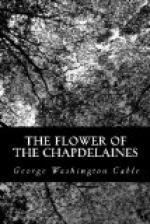At the next bedtime she began on me with the innocent question of my favorite flower, but I had not answered three other questions before she had placed me where I must either say I did not believe in the right to hold slaves, or must keep silence; and when I kept silence of course she knew. For a long moment she dropped her eyes, and then, with a soft smile, asked if I would tell her some Bible stories, preferably that of “Moses in de boundaries o’ Egyp’.”
She listened in gloating silence, rarely interrupting; but at the words, “Thus saith the Lord God of Israel, ‘Let my people go,’” the response, “Pra-aise Gawd!” rose from her lips in such volume that she threw her hands to her mouth. After that she spoke only soft queries, but they grew more and more significant, and I soon saw that her supposed content was purely a pious endurance, and that her soul felt bondage as her body would have felt a harrow. So I left the fugitives of Egyptian slavery under the frown of the Almighty in the wilderness of Sin; Sidney was trusting me; uncle and aunt were trusting me; and between them I was getting into a narrow corner. After a meditative silence my questioner asked:
“Miss Maud, do de Bible anywhuz capitulate dat Moses aw Aaron aw Joshaway aw Cable buy his freedom—wid money?”
Her manner was childlike, yet she always seemed to come up out of deep thought when she asked a question; she smiled diffidently until the reply began to come, then took on a reverential gravity, and as soon as it was fully given sank back into thought. “Miss Maud, don’t you reckon dat ef Moses had a-save’ up money enough to a-boughtened his freedom, dat’d a-been de wery sign mos’ pleasin’ to Gawd dat he ’uz highly fitten to be sot free widout paying?” To that puzzle she waited for no answer beyond the distress I betrayed, but turned to matters less speculative, and soon said good night.
On the third evening—my! If I could have given all the topography of the entire country between uncle’s plantation and my native city on the margin of the Great Lakes, with full account of its every natural and social condition, her questions would have wholly gathered them in. She asked if our climate was very hard on negroes; what clothing we wore in summer, and how we kept from freezing in midwinter; about wages, the price of food, what crops were raised, and what the “patarolers” did with a negro when they caught one at night without a pass.
She made me desperate, and when the fourth night saw her crouched on my floor it found me prepared; I plied her with questions from start to finish. She yielded with a perfect courtesy; told of the poor lot of the few free negroes of whom she knew, and of the time-serving and shifty indolence, the thievishness, faithlessness, and unaspiring torpidity of “some niggehs”; and when I opened the way for her to speak of uncle and aunt she poured forth their praises with an ardor that brought her own tears. I asked her if she believed she could ever be happy away from them.




